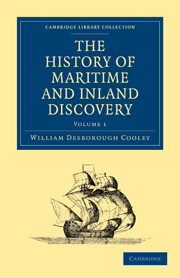Book contents
- Frontmatter
- Contents
- BOOK I GEOGRAPHY OF THE ANCIENTS
- BOOK II GEOGRAPHY OF THE MIDDLE AGES
- BOOK III PROGRESS OF GEOGRAPHY IN THE MIDDLE AGES
- CHAP. I DISCOVERIES OF THE NORTHMEN
- CHAP. II MAPS OF THE MIDDLE AGES
- CHAP. III JOURNEY OF CARPINI INTO TATARY
- CHAP. IV TRAVELS OF RUBRUQUIS
- CHAP. V TRAVELS OP MARCO POLO
- CHAP. VI TRAVELS OF MARCO POLO CONTINUED
- CHAP. VII ODERIC OF PORTENAU
- CHAP. VIII EMBASSY OF CLAVIJO
- CHAP. IX EARLY DISCOVERIES OF THE PORTUGUESE
- CHAP. X THE PASSAGE BY THE CAPE DISCOVERED
CHAP. IV - TRAVELS OF RUBRUQUIS
Published online by Cambridge University Press: 05 July 2011
- Frontmatter
- Contents
- BOOK I GEOGRAPHY OF THE ANCIENTS
- BOOK II GEOGRAPHY OF THE MIDDLE AGES
- BOOK III PROGRESS OF GEOGRAPHY IN THE MIDDLE AGES
- CHAP. I DISCOVERIES OF THE NORTHMEN
- CHAP. II MAPS OF THE MIDDLE AGES
- CHAP. III JOURNEY OF CARPINI INTO TATARY
- CHAP. IV TRAVELS OF RUBRUQUIS
- CHAP. V TRAVELS OP MARCO POLO
- CHAP. VI TRAVELS OF MARCO POLO CONTINUED
- CHAP. VII ODERIC OF PORTENAU
- CHAP. VIII EMBASSY OF CLAVIJO
- CHAP. IX EARLY DISCOVERIES OF THE PORTUGUESE
- CHAP. X THE PASSAGE BY THE CAPE DISCOVERED
Summary
The papal missions to the Tatars failed wholly in producing the effects expected from them; but they brought home some valuable information; and by making the European nations better acquainted with the character of the Mongols, tended, perhaps, not a little to moderate the apprehensions entertained of those formidable invaders. Although the austere and narrow-minded ecclesiastics, selected for those embassies, were little qualified by the habits of monastic life to succeed in such delicate negotiations, it would yet, perhaps, have been difficult to find persons better fitted by their zeal, fidelity, and patient resolution to break first the path of communication between the Christians and the Tatar conquerors: their sacred character met also with some respect, and served undoubtedly to protect them from the violent treatment to which, from their stubborn inattention to Eastern usages, they were frequently exposed.
The successors of Zingis Khan were remarkable for the indifference they manifested to religious creeds: they entertained the national belief in the existence of one God; but were wholly unacquainted with any collateral doctrines or ceremonies of religion. Yet they were not exempt from superstitious weakness, and gave a favourable reception to priests of every sect and persuasion, in order that by engaging in their interest every solemn rite and every mode of prayer, they might more surely propitiate the will of heaven. Among other ministers of religion who flocked about them were many Nestorian Christians, who, willing to magnify their own efficiency and importance, and unable to comprehend the light in which they were considered by the Mongol princes, spread abroad the rumour that these latter were actually become converts to Christianity.
- Type
- Chapter
- Information
- The History of Maritime and Inland Discovery , pp. 259 - 275Publisher: Cambridge University PressPrint publication year: 2010First published in: 1830



